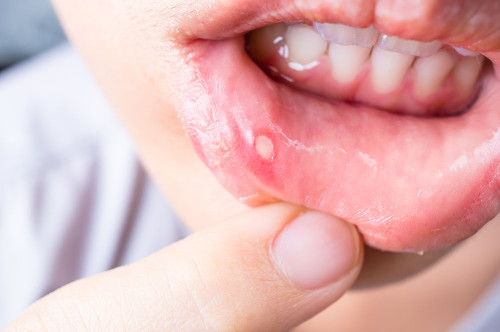Mouth ulcers Kōmaoa ā-waha
A mouth ulcer is a small painful sore that appears anywhere inside your mouth. Most mouth ulcers go away on their own but some will need treatment.
Causes of mouth ulcers
There are several possible causes of mouth ulcers.
- Trauma to your mouth such as accidentally biting the inside of your cheek.
- An injury from a broken tooth, badly fitting dentures or brushing your teeth.
- Burning the inside of your mouth with very hot food or drink.
- A food intolerance.
Things that increase your chance of having ulcers include:
- a nutrient deficiency such as low vitamin B12, folic acid or iron
- hormone changes such as from your period or pregnancy
- stress
- having another health condition such as coeliac disease, Crohn's disease or a weakened immune system
- some medicines including beta blockers and non-steroidal anti-inflammatory drugs (NSAIDs) such as ibuprofen.
Mouth ulcers are very common, affecting around 1 in 5 people.
Symptoms of a mouth ulcer
Symptoms of a mouth ulcer include:
- a shallow, pale crater inside your lip or in your mouth
- pain, especially when eating or drinking.
You can get several mouth ulcers at the same time.
Diagnosing a mouth ulcer
You can diagnose a mouth ulcer yourself from its appearance. Mouth sores are usually:
- red around the edges
- white, yellow or grey in the centre.
If your ulcer does not get better within 3 weeks or looks unusual, see your healthcare provider.
Also see your healthcare provider if you get lots of ulcers and they keep coming back.

Self care for mouth ulcers
- Make a mouthwash by putting ½ teaspoon salt in a glass of warm water. Rinse your mouth with this then spit it out. Do not swallow the salty water. You can use this as often as you like.
- If your mouth is very sore, eat soft foods and try drinking through a straw.
- Avoid acidic, spicy or very hot foods and drinks.
- Drink plenty of cool water to help sooth the ulcer.
- Use a soft toothbrush to clean your teeth.
- Avoid touching the ulcer with your tongue or fingers.
- Take paracetamol for pain.
Pain relief for adults (internal link)
Treatment for mouth ulcers
If the measures above are not enough, there are several medicines you can try. Your pharmacist can give you advice on these. Options include:
- antiseptic mouthwash such as chlorhexidine
- protective pastes
- steroid containing dental pastes
- local pain relief including sprays, mouthwashes and ointments.
Most mouth ulcers will heal in around 10 to 14 days, but they can be very painful. If your ulcer has not gone away after 3 weeks, you should see your healthcare provider or dentist.
Preventing mouth ulcers
You can reduce your chances of getting mouth ulcers by:
- getting any damaged teeth or ill-fitting dentures fixed
- not smoking
- managing stress
- avoiding food that trigger your ulcers
- eating well including getting enough iron rich foods.